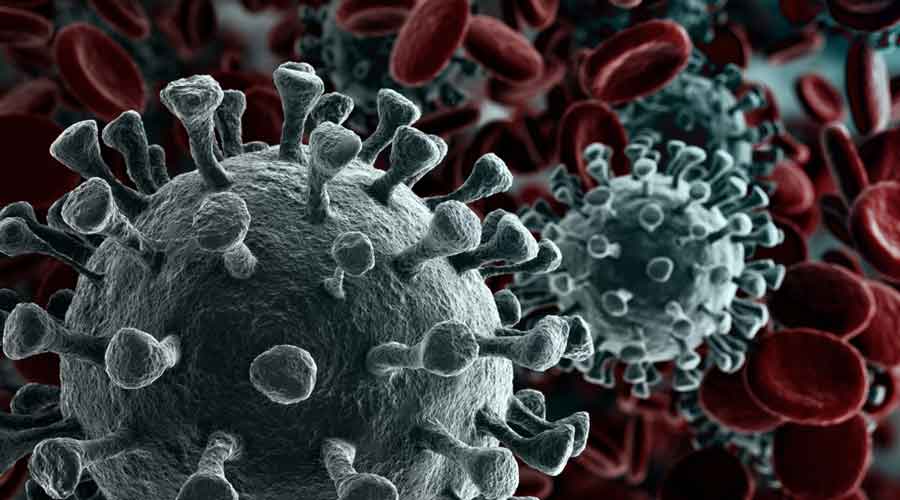Indian scientists have identified a naturally-occurring biochemical in the human body as a potential broad-acting antiviral agent that could serve as a shield against multiple viruses, including influenza, dengue, and SARS-CoV-2, the virus that causes Covid-19.
The researchers at the Indian Institute of Science (IISc), Bangalore, have through tests on lab-grown cells and experimental animals discovered that the biochemical called picolinic acid has strong antiviral activity against a wide range of enveloped viruses that cause illness in humans.
In the cells, picolinic acid showed antiviral effects against the Hong Kong, alpha, beta, gamma, and delta variants of SARS-CoV-2 and against the seasonal and H1N1 pandemic influenza, dengue, Japanese encephalitis, Zika, human parainfluenza and herpes simplex viruses. In the animal tests, picolinic acid obstructed virus replication and the disease process in hamsters infected with SARS-CoV-2 and in mice infected with an influenza virus.
“All these viruses follow a common step as they seek to infect human cells — picolinic acid blocks that common step,” said Shashank Tripathi, assistant professor at the Centre for Infectious Disease Research at the IISc who led the studies.
The IISc has staked patent claims on picolinic acid’s antiviral effect. “Our lab and animal studies look promising, but they’ll need extensive follow-up through even more detailed animal studies and clinical trials in humans,” said Tripathi.
Sections of scientists have cautioned that while the concept and premise underlying picolinic acid are reasonable and the results not surprising, more research would be critical to determine if its preliminary promise holds up.
Picolinic acid is a natural byproduct of an amino acid called tryptophan present in high-protein food such as milk, fish, chicken, cheese, or pumpkin seeds and which occurs in small concentrations in human milk, the pancreas, and the cerebrospinal fluid.
Tripathi and his colleagues had turned their attention to picolinic acid three years ago — before the emergence of SARS-CoV-2 — noting hints of its antiviral activity against the human immunodeficiency virus and herpes simplex virus from a US lab two decades ago and against the chikungunya virus from an Indian lab in 2018.
While its mechanism of antiviral action remained unclear, an independent study by South Korean researchers in 2018 had suggested picolinic acid might interfere with the entry of substances into cells — a critical step in viral infections as all viruses need to enter cells to cause infection.
The IISc scientists have now shown through their experiments that picolinic acid blocks the viral entry process by disrupting the viral membrane — a microscopic envelope-like coating on the virus — and blocking the fusion of the virus with its target cell.
“Picolinic acid’s antiviral effect shows up only against such enveloped viruses,” Tripathi said. Whether SARS-CoV-2 or other enveloped viruses, the virus first attaches itself to a target cell through a protein-protein interaction, then its membrane fuses with the cell membrane to complete its entry.
By blocking viral entry into target cells, picolinic acid prevents the virus from multiplying and causing infection. Tripathi said antiviral agents that prevent viral entry block the lifecycle of the virus before the virus can multiply and acquire mutations that might help it evade antiviral activity.
“Picolinic acid appears to be a natural antiviral substance. Our animal studies suggest that oral administration is well-tolerated and leads to an antiviral effect,” Tripathi said.
But several compounds such as hydroxychloroquine that showed antiviral activity against SARS-CoV-2 in cells or animals haven’t lived up to their promise.
“The antiviral effects of chloroquine are likely mediated by similar or related pathways,” said Satyajit Rath, an immunologist in Pune not associated with the IISc study. “Problems in safely achieving prolonged effective concentrations of such drugs in the body are possible reasons for the failure of hydroxychloroquine in clinical trials.”
One concern, Rath said, is that blocking constantly ongoing cellular properties in all cells of the body such as processes that control the entry of substances into cells is unlikely to be without consequences.India’s department of biotechnology-BIRAC and the DBT-Wellcome Trust India Alliance, a UK-India research partnership, funded the IISC research.










